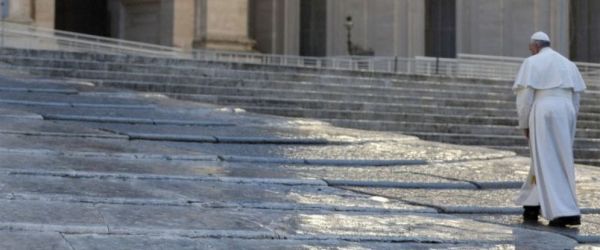In today’s Gospel the Evangelist Luke writes about Jesus who, on the way to Jerusalem, enters a village and is welcomed into the home of two sisters: Martha and Mary (cf. Lk 10:38-42). Both welcome the Lord, but they do so in different ways. Mary sits at Jesus’ feet and listens to his words (cf. v. 39), whereas Martha is completely caught up in preparing things; at a certain point she says to Jesus: “Lord, do you not care that my sister has left me to serve alone? Tell her then to help me” (v. 40). Jesus responds to her: “Martha, Martha, you are anxious and troubled about many things; one thing is needful. Mary has chosen the good portion, which shall not be taken away from her” (vv. 41-42).
In bustling about and busying herself, Martha risks forgetting — and this is the problem — the most important thing, which is the presence of the guest, Jesus in this case. She forgets about the presence of the guest. A guest is not merely to be served, fed, looked after in every way. Most importantly he ought to be listened to. Remember this word: Listen! A guest should be welcomed as a person, with a story, his heart rich with feelings and thoughts, so that he may truly feel like he is among family. If you welcome a guest into your home but continue doing other things, letting him just sit there, both of you in silence, it is as if he were of stone: a guest of stone. No. A guest is to be listened to. Of course, Jesus’ response to Martha — when he tells her that there is only one thing that needs to be done — finds its full significance in reference to listening to the very word of Jesus, that word which illuminates and supports all that we are and what we do. If we go to pray, for example, before the Crucifix, and we talk, talk, talk, and then we leave, we do not listen to Jesus. We do not allow him to speak to our heart. Listen: this is the key word. Do not forget! And we must not forget that in the house of Martha and Mary, Jesus, before being Lord and Master, is a pilgrim and guest. Thus, his response has this significance first and foremost: “Martha, Martha why do you busy yourself doing so much for this guest even to the point of forgetting about his presence? — A guest of stone! — Not much is necessary to welcome him; indeed, only one thing is needed: listen to him — this is the word: listen to him — be brotherly to him, let him realize he is among family and not in a temporary shelter.
Understood in this light, hospitality, which is one of the works of mercy, is revealed as a truly human and Christian virtue, a virtue which in today’s world is at risk of being overlooked. In fact, nursing homes and hospices are multiplying, but true hospitality is not always practised in these environments. Various institutions are opened to care for many types of disease, of loneliness, of marginalization, but opportunities are decreasing for those who are foreign, marginalized, excluded, from finding someone ready to listen to them: because they are foreigners, refugees, migrants. Listen to that painful story. Even in one’s own home, among one’s own family members, it might be easier to find services and care of various kinds rather than listening and welcome. Today we are so taken, by excitement, by countless problems — some of which are not important — that we lack the capacity to listen. We are constantly busy and thus we have no time to listen. I would like to ask you, to pose a question to you, each one answer in your own heart: do you, husband, take time to listen to your wife? And do you, woman, take time to listen to your husband? Do you, parents, take time, time to “waste”, to listen to your children? or your grandparents, the elderly? — “But grandparents always say the same things, they are boring...” — But they need to be listened to! Listen. I ask that you learn to listen and to devote more of your time. The root of peace lies in the capacity to listen.
May the Virgin Mary, Mother of listening and of service and of attentive care, teach us to be welcoming and hospitable to our brothers and our sisters.
[Pope Francis, Angelus, 17 July 2016]












